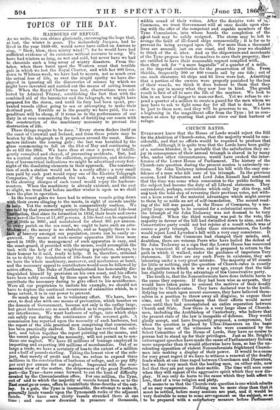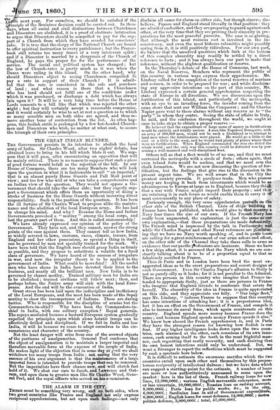CHURCH RATES.
EVERYBODY knew that the House of Lords would reject the Bill for the Abolition of Church-rates, that the majority would be con- siderable, and that no efforts would be required to produce that result. Although it is quite true that the Lords have been guilty- of a serious blunder, it is probable that the satisfaction they en- joy in consequence of their annual triumph is shared in by many who, under other circumstances, would have evoked the inter- ference of the Lower House of Parliament. The history of the Church-rate question during the present session is extremely cu- rious. Sir John Trelawny introduced his bill with the easy con- fidence of a man who felt sure of his triumph. In the previous session, Lord Palmerston and Lord John Russell had confessed that the time was come when concession to the public feeling on the subject had become the duty of all Liberal statesmen. They surrendered, perhaps, convictions which only lay skin deep, and an took the bold step of reversing their previous votes, not with- out a keen sense of the material advantages which might accrue to them by so noble an act of self-immolation. The second read- ing of the bill was passed, in the House of Commons, by a ma- jority large enough to be counted for a substantial success. But the triumph of Sir John Trelawny was not doomed to be very long-lived. When the third reading was put to the vote, the majority in favour of the bill had dwindled down to nine, and the Conservative party could not but rejoice at a result which was of course a party triumph. Under these circumstances, the Lords would reject Lord Lyveden's bill with a very easy conscience. It was clear that the Commons had changed their minds, and, doubtless, there are veteran Peers who have hailed the defeat of Sir John Trelawny as a sign that the Lower House has recovered from a transient fit of madness, and is prepared to return to the path in which it walked, under the guidance of imperious Tory statesmen. If there are any such Peers in existence, they are labouring under a very great mistake. The majority of 97 counts for little or nothing, and the question of Church-rates is exactly in the position in which is was a year ago, except that the tide has slightly turned to the advantage of the Conservative party.
The truth is, that the Nonconformists have done infinite harm to the cause they espouse. If they had been wise as serpents, they would have taken pains to conceal the motives of their deadly hostility to Church-rates. They have declared war to the knife. Relying too much upon recent successes, they have believed them- selves in a position to throw away all disguise, to expose their aims, and to tell Churchmen that their efforts would never cease until they had accomplished an entire separation between Church and State. Now there is a very large class of Church- men, including the Archbishop of Canterbury, who believe that the present state of the law is incapable of defence. They would gladly accept, and have frequently proposed, a compromise, but when the question is placed. by Ultra-Dissenters on the basis chosen by some of the witnesses who were examined by the Select Committee of the House of Lords, they have no course to pursue but to stand up for their privileges. Just as Mr. Bright's extravagant speeches have made the cause of Parliamentary Reform more unpopular than it would otherwise have been, so has the un- relenting opposition of violent Nonconformists frightened Church- men into making a display of their power. It would be a cause . for very great regret if we have to witness a renewal of the deadly feuds which at one time raged between Churchmen and Dissenters, but we fear very much that the leading men, on either side, now feel that they are put upon their mettle. The time will soon mule when they will repent of the aggressive spirit which they now dis- play. It can only do harm to the cause which they both affect to love, that of a true religion and piety.
It seems to us that the Church-rate question is one which admits of an easy compromise. Nothing can be more clear than that it must be settled, before many sessions are past, and it would be very desirable to come to some arrPr.gement on the subject, so as isto be prepared with a sati factory measure before Parliament
the s next year. For ourselves, we should be satisfied if the nciple of the Braintree decision could be carried out. In these ays, when all social and civil distinctions between Churchmen and Dissenters are abolished, it is a proof of obstinate infatuation to argue that Dissenters should be compelled to pay for the sup- port of a Church from which they have seceded for conscience' sake. It is true that the clergy of the National Church are bound to offer spiritual instruction to every parishioner; but the Prayer- book still retains too many traces of a very intolerant spirit ; and if a Dissenter is married by a clergyman of the Church of England, he pays the proper fee for the performance of the service. The social and political system has changed ; but the law of Church-rates is pretty much as it was -when the Danes were ruling in this island. On the other hand, why should Dissenters object to seeing Churchmen compelled to
ry a rate in support of their Church ? It is admit- d that the rate is considered in the sale and purchase of land ; and what reason is there that a Churchmen who has land should not fulfil one of the conditions under which it was purchased, or discharge a debt which has always lain upon it ? It will be a very long time before the House of Lords consents to a bill like that which was rejected the other night; but they will certainly accept a reasonable compromise, and it would certainly be wise to set at rest a question as to which so many sensible men on both sides are agreed, and thus re- move another bone of contention from the list. As often hap- pens, this foolish strife is prolonged by a few hot-headed Church- men and Dissenters who wish, no matter at what cost, to secure the triumph of their own principles.



























 Previous page
Previous page